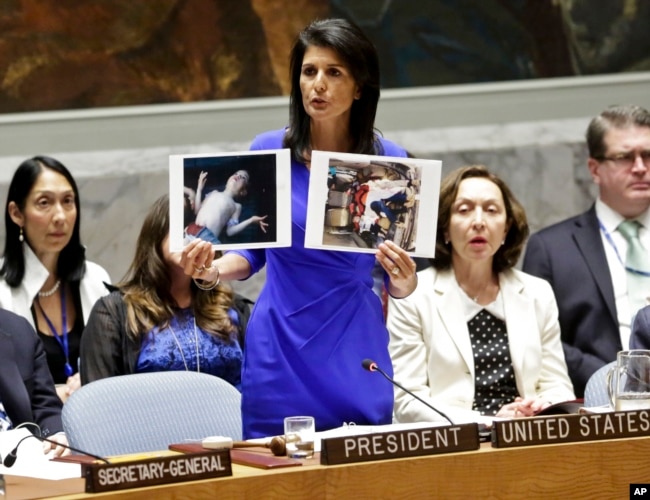
Russia on Thursday vetoed a U.S.-sponsored Security Council resolution that would have extended the international probe into chemical weapons use in Syria.
Hours later, the council rejected a Russian-sponsored resolution after it failed to get the required nine-vote minimum for passage. The Russian proposal included changes to the mandate that the U.S. opposed.
This was the 10th time Russia vetoed a resolution on Syria.
Without passage, the mandate of the Joint Investigative Mechanism expires Thursday at midnight.
U.S. Ambassador Nikki Haley said Thursday’s veto “strikes a deep blow.”
“By eliminating our ability to identify the attackers, Russia has undermined our ability to deter future attacks. [Syrian President Bashar al-] Assad and ISIS will no longer be on notice for the use of chemical weapons by Russia’s actions today,” Haley said, using an acronym for the militant group.
British Ambassador Matthew Rycroft said Russia has failed in its duties as a permanent Security Council member, a signatory to the Chemical Weapons Convention, and as someone who claims to support peace in Syria.
Russia’s ambassador, Vassily Nebenzia, called the U.S. resolution unbalanced and made only “superficial” changes to what he says are “flaws” in the JIM.
Nebenzia said it is the United States’ responsibility if the mechanism cannot be salvaged.
The Joint Investigative Mechanism began its work more than two years ago after a series of chemical weapons attacks against civilians in Syria that killed or injured hundreds.
The U.N. investigators have blamed the Syrian military for using poison gas, saying the rebels do not have aircraft or the ability to launch such attacks.
Syria says terrorists — its word for the opposition — are responsible.
Russia, which is Syria’s most powerful ally, has supported investigations into chemical weapons but criticized the reports as being unfair to the Syrians. | via VOANews

